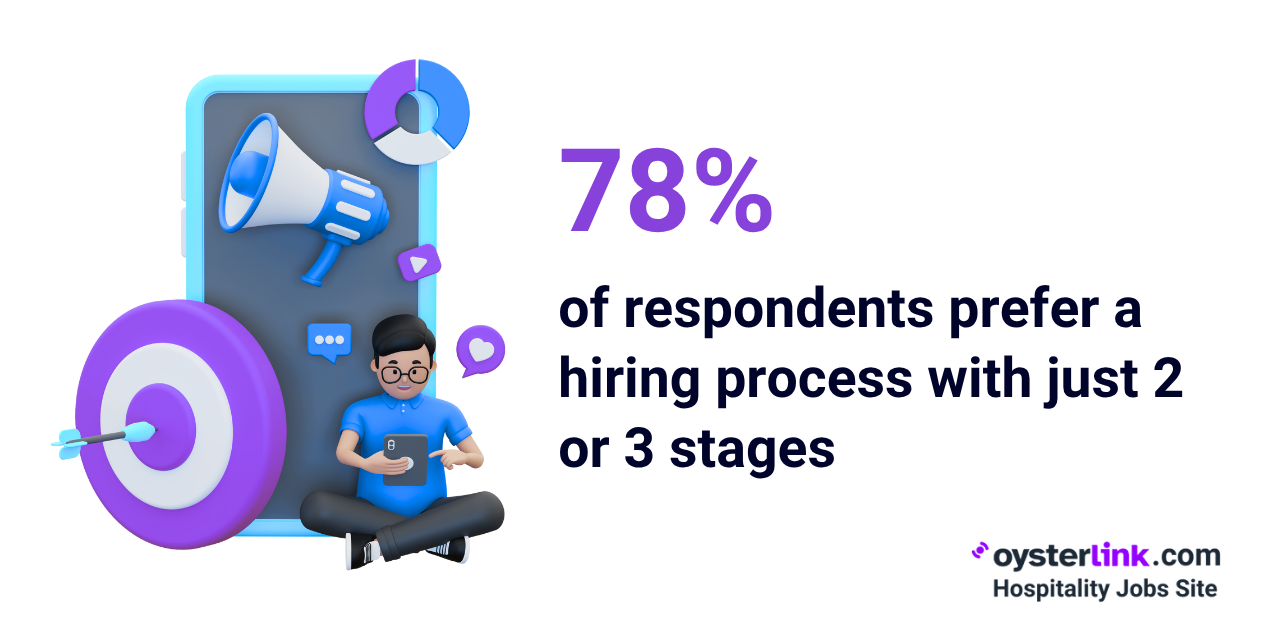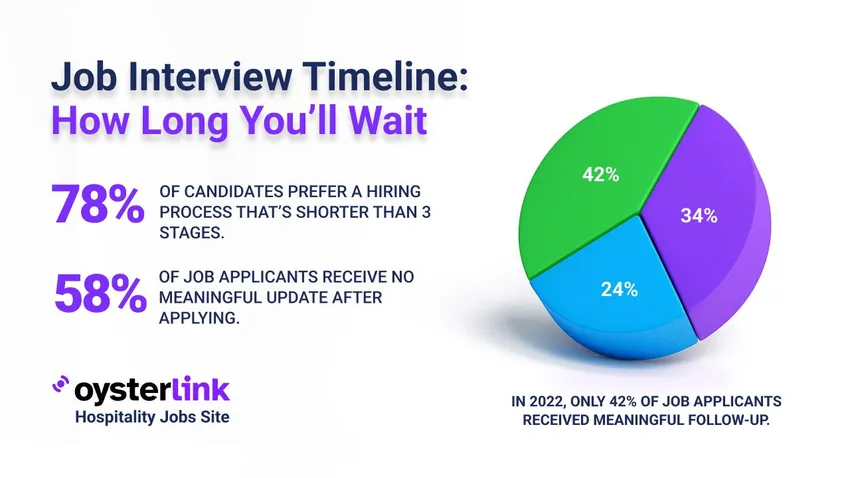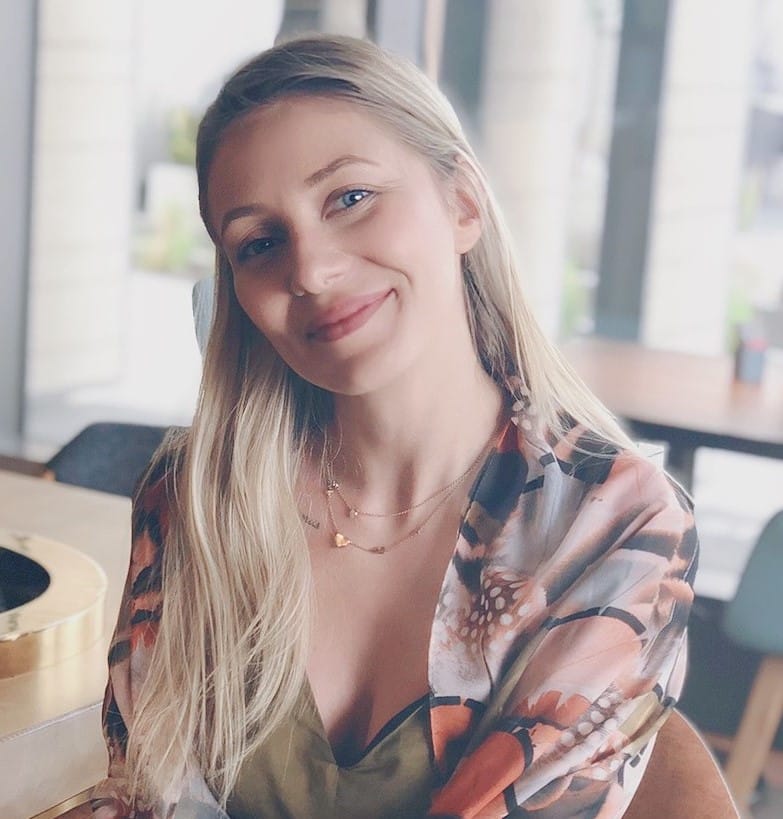Job Interview Timeline: 3 Key Takeaways
- The average hiring timeline in the hospitality industry is 39 days, slightly faster than other sectors.
- 78% of hospitality professionals favor interview processes with only 2 or 3 stages, preferring speed and simplicity.
- Over half of candidates (52%) report waiting 3+ months to hear back from employers.
Job interview timeline expectations can be confusing, but understanding how long it takes to hear back after a job posting closes puts you ahead of the curve.
In this guide, we break down each phase, show you what to expect, and share strategies to stay proactive while you wait.
Understanding the Job Interview Timeline and Application Process
From the moment a position is advertised to the point where interviews are scheduled, numerous factors come into play.
These can significantly impact how long after a job posting closes do they interview candidates.
Stages of the application process
- Companies advertise open positions through various channels.
- Candidates submit their resumes and cover letters.
- Employers review applications to identify potential matches.
- Promising candidates are selected for further consideration.
- Chosen applicants are contacted for interviews.
According to an OysterLink survey, 78% of hospitality professionals prefer two or three stages,.

Factors influencing the timeline
Several elements can impact the time between a job posting closing and interview invitations being sent out:
- Company size: Larger organizations often have more complex hiring processes.
- Industry norms: Some sectors move faster than others in recruitment.
- Position level: Executive roles typically have longer hiring timelines.
- Number of applicants: A high volume of applications can extend the review process.
- Urgency of the role: Positions that need to be filled quickly may have accelerated timelines.
These factors interplay to create a unique timeline for each job opening. Being aware of them can help you gauge the potential waiting period.
Source: Indeed
Job Interview Timeline: What to Expect at Each Stage
Let’s break down what you might expect during different phases of the hiring process.
- Application review: Typically 1–2 weeks after job posting closes; may vary by applicant volume and company resources.
- Shortlisting: Another 1–2 weeks to identify candidates for interviews, sometimes including phone screenings.
- Interview scheduling: Usually begins within a week, but can take 2–3 weeks if schedules are hard to coordinate.
- Total timeline: Expect 2–6 weeks from job posting close to first interviews, though this can vary.
How Company Size Impacts the Job Interview Timeline
The size of a company plays a significant role in determining how long after a job posting closes do they interview candidates.
- Small businesses/Startups: Fast, flexible hiring with direct decision-maker contact; responses often within 1–3 weeks.
- Medium-size companies: Structured processes and multiple stakeholders; typically 2–4 weeks.
- Large corporations: Lengthy, multi-step processes with cross-department coordination; often takes 4–8+ weeks.
How Urgency Affects the Job Interview Timeline
The urgency with which a position needs to be filled can significantly impact how long after a job posting closes do they interview candidates.
- High-priority roles: Fast-tracked with immediate screening. Interviews may happen within a week of posting.
- Standard roles: Follow typical hiring timelines. Expect 2–4 weeks before interviews begin.
- Long-term planning roles: Slower process with multiple rounds. Interviews might start 6–8 weeks after posting.
These positions often involve strategic hires or roles that are part of future expansion plans.
Source: Glassdoor
How Application Volume Shapes the Job Interview Timeline
The number of applications received for a position can significantly influence how long after a job posting closes do they interview candidates.
- Low volume: faster reviews and decisions. Interviews may start 1–2 weeks after closing.
- Moderate volume: Standard review pace. Interviews usually scheduled 2–4 weeks after closing.
- High volume: Longer processing with tiered screening. Interviews may be delayed 4–6 weeks or more.
Source: U.S. Bureau of Labor Statistics
Staying Informed: Communication During the Job Interview Timeline
Understanding what to expect in terms of communication can help manage anxiety during the waiting period after a job posting closes.
- Most companies send a confirmation email after you apply. It confirms receipt but rarely includes next steps.
- Some employers send updates on your application's progress or estimated timelines. Others only contact shortlisted candidates.
- Interview invitations are usually sent by email or phone 2–4 weeks after the posting closes.
52% candidates report waiting three months or more to receive a response to their job application.
How to Stay Proactive During the Job Interview Timeline Waiting Period
While waiting to hear back about potential interviews, there are several strategies you can employ to stay proactive:
- Apply to multiple roles and explore different companies to stay flexible and avoid relying on one outcome.
- Take online courses, earn certifications, and network to boost your qualifications and stay active in your field.
- Wait at least a week after the closing date, then send a polite email. Follow up no more than once every 1–2 weeks.
When the Job Interview Timeline Stalls: Signs It’s Time to Move On
While patience is important in the job search process, it’s also crucial to recognize when it’s time to shift your focus.
- If it’s been 4–6 weeks with no response, it's likely time to move on.
- Generic or unclear replies often mean low interest. Stay polite, but focus on more promising opportunities.
- If the posting disappears or the company restructures, the role may be filled or canceled.
Source: Smart Recruiters
Rejections are never easy, but they can lead to better opportunities with the right tools and mindset.
Navigating the Job Interview Timeline With Patience and Proactivity
Understanding the hiring process and its typical timelines gives you a clearer picture of what to expect.
Every role and company is unique, but knowing the factors at play helps you approach your job search with confidence.
Balance patience with action — continue applying, build your skills and maintain professional follow-ups.
Your persistence and preparation will pay off when the right opportunity comes along.









Loading comments...